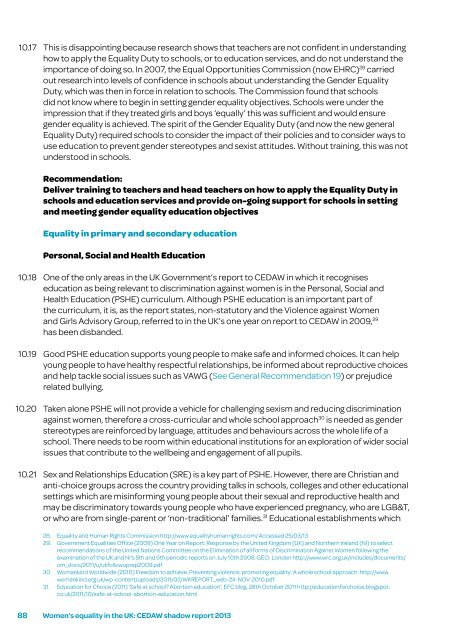Women’s equality in the UK – A health check
Women’s equality in the UK – A health check
Women’s equality in the UK – A health check
Create successful ePaper yourself
Turn your PDF publications into a flip-book with our unique Google optimized e-Paper software.
10.17<br />
10.18<br />
10.19<br />
10.20<br />
10.21<br />
This is disappo<strong>in</strong>t<strong>in</strong>g because research shows that teachers are not confident <strong>in</strong> understand<strong>in</strong>g<br />
how to apply <strong>the</strong> Equality Duty to schools, or to education services, and do not understand <strong>the</strong><br />
importance of do<strong>in</strong>g so. In 2007, <strong>the</strong> Equal Opportunities Commission (now EHRC) 28 carried<br />
out research <strong>in</strong>to levels of confidence <strong>in</strong> schools about understand<strong>in</strong>g <strong>the</strong> Gender Equality<br />
Duty, which was <strong>the</strong>n <strong>in</strong> force <strong>in</strong> relation to schools. The Commission found that schools<br />
did not know where to beg<strong>in</strong> <strong>in</strong> sett<strong>in</strong>g gender <strong>equality</strong> objectives. Schools were under <strong>the</strong><br />
impression that if <strong>the</strong>y treated girls and boys ‘equally’ this was sufficient and would ensure<br />
gender <strong>equality</strong> is achieved. The spirit of <strong>the</strong> Gender Equality Duty (and now <strong>the</strong> new general<br />
Equality Duty) required schools to consider <strong>the</strong> impact of <strong>the</strong>ir policies and to consider ways to<br />
use education to prevent gender stereotypes and sexist attitudes. Without tra<strong>in</strong><strong>in</strong>g, this was not<br />
understood <strong>in</strong> schools.<br />
Recommendation:<br />
Deliver tra<strong>in</strong><strong>in</strong>g to teachers and head teachers on how to apply <strong>the</strong> Equality Duty <strong>in</strong><br />
schools and education services and provide on-go<strong>in</strong>g support for schools <strong>in</strong> sett<strong>in</strong>g<br />
and meet<strong>in</strong>g gender <strong>equality</strong> education objectives<br />
Equality <strong>in</strong> primary and secondary education<br />
Personal, Social and Health Education<br />
One of <strong>the</strong> only areas <strong>in</strong> <strong>the</strong> <strong>UK</strong> Government’s report to CEDAW <strong>in</strong> which it recognises<br />
education as be<strong>in</strong>g relevant to discrim<strong>in</strong>ation aga<strong>in</strong>st women is <strong>in</strong> <strong>the</strong> Personal, Social and<br />
Health Education (PSHE) curriculum. Although PSHE education is an important part of<br />
<strong>the</strong> curriculum, it is, as <strong>the</strong> report states, non-statutory and <strong>the</strong> Violence aga<strong>in</strong>st Women<br />
and Girls Advisory Group, referred to <strong>in</strong> <strong>the</strong> <strong>UK</strong>’s one year on report to CEDAW <strong>in</strong> 2009, 29<br />
has been disbanded.<br />
Good PSHE education supports young people to make safe and <strong>in</strong>formed choices. It can help<br />
young people to have <strong>health</strong>y respectful relationships, be <strong>in</strong>formed about reproductive choices<br />
and help tackle social issues such as VAWG (See General Recommendation 19) or prejudice<br />
related bully<strong>in</strong>g.<br />
Taken alone PSHE will not provide a vehicle for challeng<strong>in</strong>g sexism and reduc<strong>in</strong>g discrim<strong>in</strong>ation<br />
aga<strong>in</strong>st women, <strong>the</strong>refore a cross-curricular and whole school approach 30 is needed as gender<br />
stereotypes are re<strong>in</strong>forced by language, attitudes and behaviours across <strong>the</strong> whole life of a<br />
school. There needs to be room with<strong>in</strong> educational <strong>in</strong>stitutions for an exploration of wider social<br />
issues that contribute to <strong>the</strong> wellbe<strong>in</strong>g and engagement of all pupils.<br />
Sex and Relationships Education (SRE) is a key part of PSHE. However, <strong>the</strong>re are Christian and<br />
anti-choice groups across <strong>the</strong> country provid<strong>in</strong>g talks <strong>in</strong> schools, colleges and o<strong>the</strong>r educational<br />
sett<strong>in</strong>gs which are mis<strong>in</strong>form<strong>in</strong>g young people about <strong>the</strong>ir sexual and reproductive <strong>health</strong> and<br />
may be discrim<strong>in</strong>atory towards young people who have experienced pregnancy, who are LGB&T,<br />
or who are from s<strong>in</strong>gle-parent or ‘non-traditional’ families. 31 Educational establishments which<br />
28. Equality and Human Rights Commission http://www.<strong>equality</strong>humanrights.com/ Accessed 25/03/13<br />
29. Government Equalities Office (2009) One Year on Report: Response by <strong>the</strong> United K<strong>in</strong>gdom (<strong>UK</strong>) and Nor<strong>the</strong>rn Ireland (NI) to select<br />
recommendations of <strong>the</strong> United Nations Committee on <strong>the</strong> Elim<strong>in</strong>ation of all forms of Discrim<strong>in</strong>ation Aga<strong>in</strong>st Women follow<strong>in</strong>g <strong>the</strong><br />
exam<strong>in</strong>ation of <strong>the</strong> <strong>UK</strong> and NI’s 5th and 6th periodic reports on July 10th 2008. GEO: London http://www.wrc.org.uk/<strong>in</strong>cludes/documents/<br />
cm_docs/2011/u/ukfollowuprep2009.pdf<br />
30. Womank<strong>in</strong>d Worldwide (2010) Freedom to achieve. Prevent<strong>in</strong>g violence, promot<strong>in</strong>g <strong>equality</strong>: A whole school approach. http://www.<br />
womank<strong>in</strong>d.org.uk/wp-content/uploads/2011/02/WKREPORT_web-24-NOV-2010.pdf<br />
31. Education for Choice (2011) ‘Safe at school? Abortion education’, EFC blog, 28th October 2011 http://educationforchoice.blogspot.<br />
co.uk/2011/10/safe-at-school-abortion-education.html<br />
88 <strong>Women’s</strong> <strong>equality</strong> <strong>in</strong> <strong>the</strong> <strong>UK</strong>: CEDAW shadow report 2013


